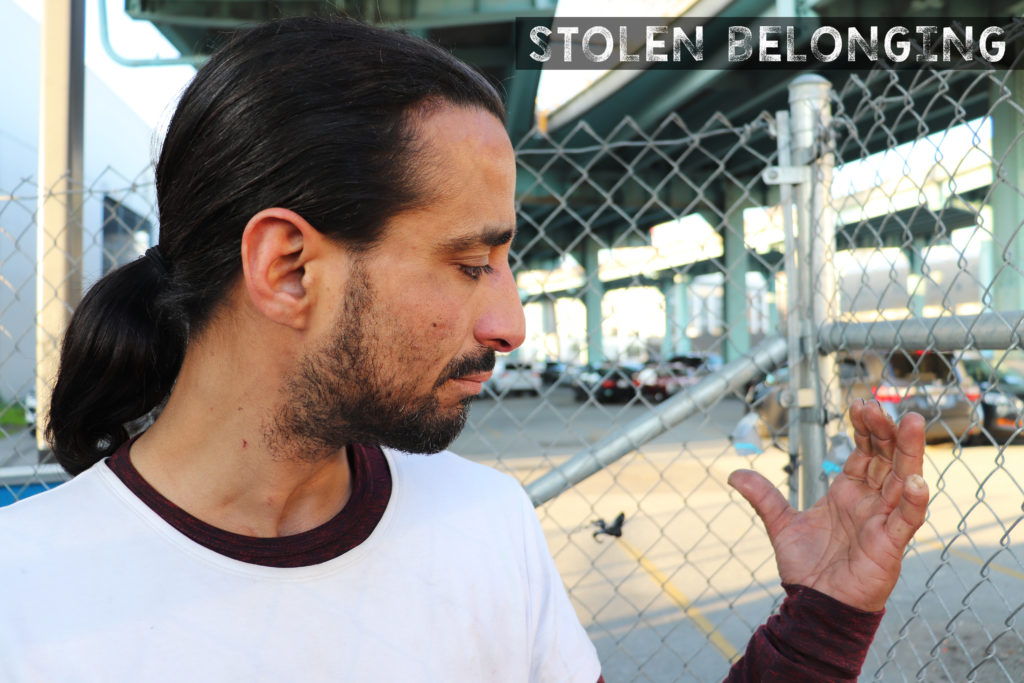Thief: The City of SF – DPW & SFPD
Interview with Angel Amador by the Stolen Belonging team, January 4, 2019, Soma District, San Francisco.
Angel Amador: My name’s Angel. I’ve been in San Francisco since 1998. I ran away from home at 15, and San Francisco was one of the first places on my things to do, places to go list. [The sweeps have been] an ongoing thing where they’ve taken my belongings over and over and over and over. Thousands of dollars worth of stuff over time has been stolen from me by either DPW or SFPD. Throughout that time that they’ve been basically robbing me continuously, I’ve lost things that I’ll never be able to get back. I’ve lost pictures of my daughter that I don’t get to see. I had three pictures that were my… everything, basically.

When I had these pictures, I would wake up and I would flip through them. One of them, she’s posing. We were at a concert, and she’s posing, doing a peace sign, trying to be hip. That’s the one that that I see in my head whenever I think of her, that I could still remember really well. But yeah, I would wake up every morning and I would take the pictures out, and they would be my strength to get up that day and do whatever it is that I had to do that I didn’t want to do. It’s raining, the cops are telling me I got to move, and I pull out my pictures of my daughter and be like, “I got this,” and I’d get to doing whatever I had to do. Now, I still do that, I’m trying to remember what she looked like in those pictures, but it’s… Just the fact that they’re not there, it makes me want to rebel against anything that they’re saying or anything that they’re… I don’t want to even comply whatsoever. It’ll be raining or whatever, and they’ll take your sleeping bag, your blankets and your… I don’t know. It’s very, very hard to deal with.
Stolen Belonging team: What do you think the city should do to compensate you for that loss?
Angel Amador: If my loss were to lead to that stopping, if my loss were to actually have value and to lead to whatever laws being put in place so that they can’t continue to do this, then I would be happy with that. It’d be cool if they could help me, because with a little help, I can do it for myself, I can help other people. But more than anything, I don’t think that people should have to go through that. I think that [city workers] should protect and serve. They should be asking us what we need to help and how… There should be things in place for them to assist us to get out of this position that they don’t want us in. Versus just trying to bully us and rob us, they should be coming to us like, “Hey, we can’t have you here, but we have this here for you, and you can store your things here.”
Stolen Belonging team: Do you think that people believe that this is happening to us? That DPW and the cops are coming in, taking our stuff?
Angel Amador: They see it happening and they don’t comprehend that that’s everything we have, period. Some people, let’s say they lost their house recently, they got all their belongings, everything they’ve ever had in their whole life that they could pull out of the rubble, and they get to here and they’re thinking, “Okay, I can do it. I’m going to… ” Then DPW and the cops come and steal all their stuff. It’s real easy to lose all hope, really, really, really easily.
Stolen Belonging team: What would you say to someone that was at that point of losing hope because of what is done to them? What words would you give them?
Angel Amador: I feel like words aren’t really what that person needs. I would just try and be there for them. Continuously stop by and make sure they’re doing okay, and ask them if they’re all right. Not just that day, but every day maybe, or religiously. Have a way where they can call me if they need some help. Give them hope, be the hope. Like a neighbor or tribe – leave no man, woman or child behind – and we wouldn’t have this problem.
Stolen Belonging team: What would you say to a “housie” or a city worker, so they could see this incident from your point of view?
Angel Amador: For one, it would take somebody with an open mind to be able to comprehend it, because I’ve spoken to “housies” about this situation and some people just have no comprehension whatsoever. A lot of people are like, “Okay. You have two legs, you have two arms, you can speak, what’s stopping you from having whatever I got, or from going out and getting a job, or going and doing this?” or whatever. For some of us, it’s not that easy. Some of us have psychological, mental, physical issues that you can’t see or just things that make it really difficult. If given the proper assistance and the proper options, everybody can actually get to the point of being a “housie” or whatever, but it takes some extra special attention.

